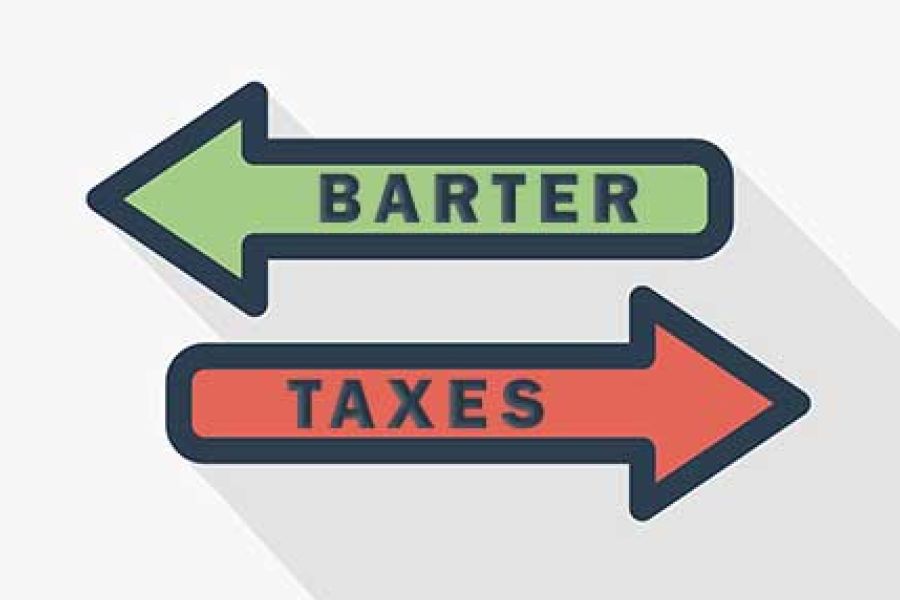Small businesses may find it beneficial to barter for goods and services instead of paying cash for them. But know that bartering is a taxable transaction. The fair market value of goods that you receive in bartering is taxable income. And if you exchange services with another business, the transaction results in taxable income for both parties. Income is also realized if services are exchanged for property. For example, if a construction firm does work for a retail business in exchange for unsold inventory, it will have income equal to the fair market value of the inventory. Barter clubs Many business owners join barter clubs that facilitate barter exchanges. In general, these clubs use a system of “credit units” that are awarded to members who provide goods and...

The Tax Cuts and Jobs Act (TCJA) has changed the landscape for business taxpayers. These changes have caused many business owners to ask: Which entity is most suitable for me? TCJA introduced a flat 21% federal income tax rate for C corporations. Under prior law, profitable C corporations paid up to 35%. TCJA also cut individual income tax rates, which apply to sole proprietorships and pass-through entities, including partnerships, S corporations, and LLCs (treated as partnerships for tax purposes). However, the top rate dropped from 39.6% to only 37%. Which entity is most suitable: Entity tax basics Before the TCJA, conventional wisdom was that most small businesses should be set up as sole proprietorships or pass-through entities to avoid the double taxation of C corporations. A C corporation pays...
Is your business hiring this summer? If so, there may be some summer hire tax credits available to you. If the employees come from certain “targeted groups,” you may be eligible for the Work Opportunity Tax Credit (WOTC). This includes youth whom you bring in this summer for two or three months. The maximum credit employers can claim is $2,400 to $9,600 for each eligible employee. Summer hire tax credits: WOTC 10 targeted groups An employer is generally eligible for the credit only for qualified wages paid to members of 10 targeted groups: Qualified members of families receiving assistance under the Temporary Assistance for Needy Families program, Qualified veterans, Designated community residents who live in Empowerment Zones or rural renewal counties, Qualified ex-felons, Vocational rehabilitation referrals, Qualified...
If federal income tax and employment taxes (including Social Security) are withheld from employees’ paychecks and not handed over to the IRS, the so-called 100% Payroll Tax Penalty can be imposed. To make matters worse, the penalty can be assessed personally against a “responsible individual.” If a business makes payroll tax payments late, there are escalating penalties. And if an employer fails to make them, the IRS will crack down hard. With the “Trust Fund Recovery Penalty,” also known as the “100% Payroll Tax Penalty,” the IRS can assess the entire unpaid amount against a responsible person who willfully fails to comply with the law. Some business owners and executives facing a cash flow crunch may be tempted to dip into the payroll taxes withheld from employees....
Roth 401(k) accounts have been around for 13 years now. Studies show that more employers are offering them each year. A recent study by the Plan Sponsor Council of America (PSCA) found that Roth 401(k) Plans are now available at 70% of employer plans, up from 55.6% of plans in 2016. However, despite the prevalence of employers offering Roth 401(k)s, most employees aren’t choosing to contribute to them. The PSCA found that only 20% of participants who have access to a Roth 401(k) made contributions to one in 2017. Perhaps it’s because they don’t understand them. If you offer a Roth 401(k) Plan or you’re considering one, educate your employees about the accounts to boost participation. Roth 401(k) Plans: a 401(k) with a twist As the name implies, these...
Summer is here, so you might be thinking about getting some vacation time. If you’re self-employed or a business owner, you have a golden opportunity for combining business with pleasure travel for a few extra days and offset some of the cost with a tax deduction. But be careful, or you might not qualify for the write-offs you’re expecting. Combining business with pleasure travel: basic rules Business travel expenses can potentially be deducted if the travel is within the United States and the expenses are: “Ordinary and necessary” and Directly related to the business. Note: The tax rules for foreign business travel are different from those for domestic travel. Business owners and the self-employed are generally eligible to deduct business travel expenses if they meet the tests described...
Here are some of the key Q3 2019 deadlines for businesses and other employers that are tax related. Keep in mind that this list isn’t all-inclusive, so there may be additional deadlines that apply to you. July 31 Report income tax withholding and FICA taxes for the second quarter of 2019 (Form 941) and pay any tax due. (See the exception below, under “August 12.”) File a 2018 calendar-year retirement plan report (Form 5500 or Form 5500-EZ) or request an extension. August 12 Report income tax withholding and FICA taxes for the second quarter of 2019 (Form 941), if you deposited on time and in full all of the associated taxes due. September 16 If a calendar-year C corporation, pay the third installment of 2019...
If you’re a business owner and you hire your children (or grandchildren) this summer, you can obtain tax breaks and other non-tax benefits. The kids can gain on-the-job experience, save for college and learn how to manage money. And you may be able to: Shift your high-taxed income into tax-free or low-taxed income, Realize payroll tax savings (depending on the child’s age and how your business is organized), and Enable retirement plan contributions for the children. Hire your children, but it must be a real job When you hire your child, you get a business tax deduction for employee wage expenses. In turn, the deduction reduces your federal income tax bill, your self-employment tax bill (if applicable), and your state income tax bill (if applicable). However, in...
If you've read the Internal Revenue Code, you may be surprised to find that most business deductions aren’t specifically listed. It doesn’t explicitly state that you can deduct office supplies and certain other expenses. Some expenses are detailed in the tax code, but the general rule is contained in the first sentence of §162. It states you can write off “all the ordinary and necessary expenses paid or incurred during the taxable year in carrying on any trade or business.” Ordinary and necessary business expenses basic definitions In general, an expense is ordinary if it’s considered common or customary in the particular trade or business. For example, insurance premiums to protect a store would be an ordinary business expense in the retail industry. A necessary expense is defined as...
Employee vs Independent Contractor is an age old question. Many employers prefer to classify workers as independent contractors to lower costs, even if it means having less control over a worker’s day-to-day activities. But the government is on the lookout for businesses that classify workers as independent contractors simply to reduce taxes or avoid their employee benefit obligations. Why it matters When your business classifies a worker as an employee, you generally must withhold federal income tax and the employee’s share of Social Security and Medicare taxes from his or her wages. Your business must then pay the employer’s share of these taxes, pay federal unemployment tax, file federal payroll tax returns and follow other burdensome IRS and U.S. Department of Labor rules. You may also have to...











